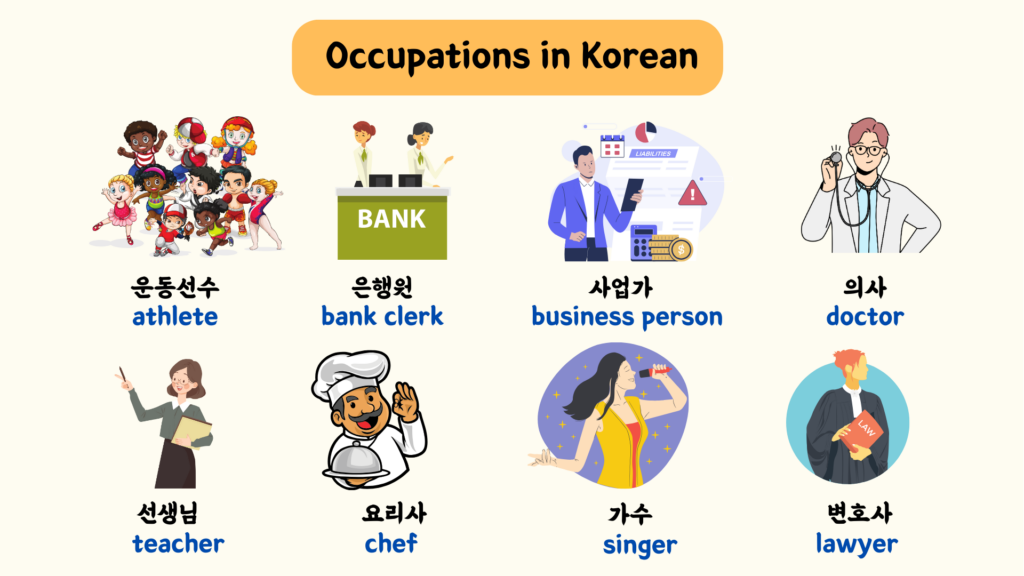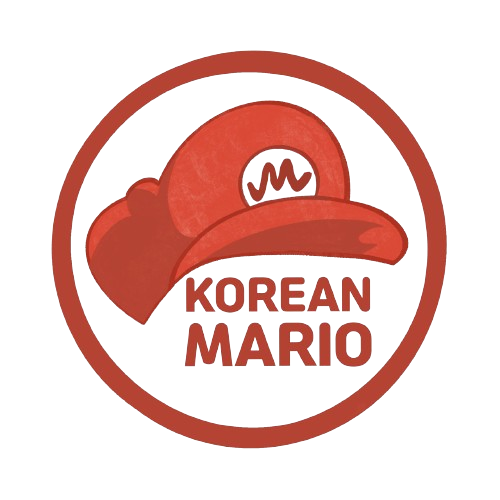
Today’s focus is on learning valuable vocabulary related to describing occupations in Korean
As mentioned in our previous article about time and date, 일 (il) takes on a different meaning when used alone, but here it signifies “work” of any kind.
직업 (ji-geob) translates to “job.”
To inquire about someone’s occupation, you can ask,
“무슨 일을 하세요?” (mo-seun eel-eul ha-seo-yo)
“What do you do?”
If you want to know someone’s specific job, you can ask,
“직업이 뭐예요?” (ji-geo-bi mwo-ye-yo)
“What is your job?”
Now, let’s explore a list of professions and occupations to enhance your Korean vocabulary!
Job Titles in Korean
Learning Korean occupation words is valuable for enhancing communication skills and cultural understanding. These words allow us to discuss professions, careers, and roles in various contexts, from everyday conversations to professional settings. By expanding our vocabulary in this area, we can better express ourselves, ask questions about others’ occupations, and engage more deeply with Korean culture. Additionally, familiarity with Korean occupation words opens up opportunities for networking, career exploration, and learning about different industries and fields. Overall, mastering these words enriches our language abilities and facilitates meaningful connections with Korean speakers.

Accountant
회계사 (hue gye sa)

Actor/Actress
배우 (bae wu)

Architect
건축가 (geon chuk ga)

Artist
예술가 (ye sul ga)

Athlete
운동선수 (un dong seon su)

Author
작가 (jag ga)

Bank clerk
은행원 (eun haeng won)

Business person/Entrepreneur
사업가 (sa eob ga)

Car mechanic
정비사 (jeong bi sa)

Cashier
종업원 (jong eob won)

CEO/President
사장 (sa jang)

Chef/Cook
요리사 (yo ri sa)

Composer
작곡가 (jag gok ga)

Dentist
치과의사 (chi gwa eui sa)

Detective/Investigator
탐정 (tam jeong)

Dietitian/Nutricionist
영양사 (yeong yang sa)

Doctor
의사 (eui sa)

Employee/Office worker
회사원 (hue sa won)

Engineer/Technician
기술자 (gi sul ja)

Entertainer/Celebrity
연예인 (yeon yei in)

business man
사업가 (sa eob ga)

Farmer
농부 (nong bu)

Firefighter
소방관 (so bang gwan)

Flight attendant
승무원 (seung mu won)

Government official
공무원 (gong mu won)

Hairdresser
미용사 (mi yong sa)

Housewife
주부 (ju bu)

Interpreter/Translator
통역사 (tong yeok sa)

Inventor
발명가 (bal myeong ga)

Lawyer
변호사 (byeon ho sa)

Lifeguard
안전요원 (an jeon yo won)

Magician
마술사 (ma sul sa)

Mail carrier/Postman
우체부 (yu chei bu)

Manager
매니저 (mae ni jeo)

Military personnel/Soldier
군인 (gun in)

Movie director/Filmmaker
영화 감독 (yeong hwa gam dok)

Musician
음악가 (eum ak ga)

Model
모델 (mo del)

Nanny
육아 도우미 (yug a do u mi)

Nurse
간호사 (gan ho sa)

Pastor
목사 (mog sa)

Pharmacist
약사 (yag sa)

Photographer
사진사 (sa jin sa)

Pilot
조종사 (jo jong sa)

Police officer
경찰 (gyeong chal)

Politician
정치인 (jeong chi in)

Teacher
선생님 (seon saeng nim)

Programmer
프로그래머 (peu ro geu rae meo)

Priest
신부님 (shin bu nim)

Principal
교장 선생님 (gyo jang seon saeng nim)

Real estate agent
공인중개사 (gong in jung gae sa)

Referee
심판 (sim pan)

Reporter
기자 (gi ja)

Salesman
판매원 (pan mae won)

Scientist
과학자 (gwa hak ja)

Security guard
경비 (gyeong bi)

Singer
가수 (ga su)

Social worker
사회복지사 (sa hwe bok ji sa)

Student
학생 (hak saeng)

Taxi driver
택시기사 (taek si gi sa)

Translator
번역가 (beon yeok ga)

Travel agent
여행사 (yeo haeng sa)

Unemployed
백수 (baek su)

Writer/Author
작가 (jag ga)

Professor
교수님 (gyo su nim)
In conclusion, learning Korean occupation words is an essential step in improving language skills and cultural understanding. These words help us discuss professions, careers, and roles in various contexts, enabling better communication and deeper engagement with Korean culture. By expanding our vocabulary in this area, we can express ourselves more clearly, ask questions about others’ occupations, and connect with Korean speakers on a deeper level. Embracing these words opens up opportunities for personal and professional growth, enriching our language abilities and fostering meaningful connections in both social and professional settings.

